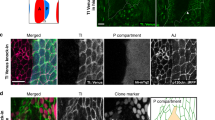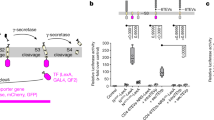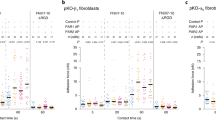Abstract
The target site of adhesion-blocking Fab in aggregating Dictyostelium discoideum cells is a plasma membrane glycoprotein of approximate molecular weight 82,000 (refs 1–3), which is no longer synthesized after aggregation, and disappears from the plasma membrane4,5. However, since cell adhesion remains important during later stages of differentiation6–8, presumably another protein(s) takes over its function. One candidate is a glycoprotein (molecular weight 95,000) whose synthesis commences at the tip stage and continues until the completion of development5,8. Both proteins are strongly antigenic4. When pseudoplasmodia (‘slugs’, a late developmental stage) are disaggregated and replated, the cells recapitulate the previous sequence of morphological changes much more quickly than before6–8, although the glycoprotein of molecular weight 82,000 is not resynthesized during reaggregation4,8. We report here that monovalent antibody (Fab) directed against slug plasma membranes inhibits reaggregation by binding to the glycoprotein of molecular weight 95,000 which thus seems to be involved in cell adhesion.
This is a preview of subscription content, access via your institution
Access options
Subscribe to this journal
Receive 51 print issues and online access
$199.00 per year
only $3.90 per issue
Buy this article
- Purchase on Springer Link
- Instant access to full article PDF
Prices may be subject to local taxes which are calculated during checkout
Similar content being viewed by others
References
Beug, H., Katz, F. & Gerisch, G. J. Cell Biol. 56, 647–658 (1973).
Müller, K. & Gerisch, G. Nature 274, 445–449 (1978).
Müller, K., Gerisch, G., Fromme, L., Mayer, M. & Tsugita, A. Eur. J. Biochem. 99, 419–426 (1979).
Parish, R. W., Schmidlin, S. & Parish, C. R. FEBS Lett. 95, 366–370 (1978).
Parish, R. W. & Schmidlin, S. FEBS Lett. 98, 251–256 (1979).
Newell, P., Longlands, M. & Sussman, M. J. molec. Biol. 58, 541–554 (1971).
Soll, D. R. Devl. Biol. 47, 292–302 (1975).
Parish, R. W. & Schmidlin, S. FEBS Lett. 99, 270–274 (1979).
Steinemann, C., Hintermann, R. & Parish, R. W. FEBS Lett. 108, 379–384 (1979).
Geltosky, J. E., Weseman, J., Bakke, A. & Lerner, R. A. Cell 18, 391–398 (1979).
Bozzaro, S. & Gerisch, G. J. molec. Biol. 120, 265–279 (1978).
Takeuchi, I. Devl. Biol. 8, 1–26 (1973).
Francis, D. & O'Day, D. J. exp. Zool. 176, 265–272 (1971).
Müller, U. & Hohl, H. R. Differentiation 1, 265–272 (1973).
Forman, D. & Garrod, D. R. J. Embryol. exp. Morphol. 40, 229–243 (1977).
Durston, A. J. & York, F. J. Cell Sci. 36, 261–279 (1979).
Author information
Authors and Affiliations
Rights and permissions
About this article
Cite this article
Steinemann, C., Parish, R. Evidence that a developmentally regulated glycoprotein is target of adhesion-blocking Fab in reaggregating Dictyostelium. Nature 286, 621–623 (1980). https://doi.org/10.1038/286621a0
Received:
Accepted:
Issue Date:
DOI: https://doi.org/10.1038/286621a0
This article is cited by
-
Cell adhesion in the life cycle ofDictyostelium
Experientia (1995)
-
Dual role for Dictyostelium contact site B in phagocytosis and developmental size regulation
Nature (1984)
-
Mechanism of sequential induction of cell-type specific mRNAs in Dictyostelium differentiation
Nature (1984)
-
How cells live together
Nature (1981)
Comments
By submitting a comment you agree to abide by our Terms and Community Guidelines. If you find something abusive or that does not comply with our terms or guidelines please flag it as inappropriate.



